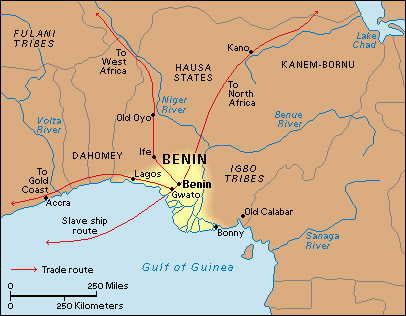Benin, << beh NEEN >> was a West African kingdom that flourished from the early 1400’s to the late 1800’s. For most of that time, Benin was the most powerful state in the forest region of what is now Nigeria. At its peak, Benin controlled several states along the coast of the Gulf of Guinea, from Lagos in the west to Bonny in the east. The largest and most important ethnic group in Benin were the Edo.

Benin reached the height of its power in the late 1400’s and the 1500’s. In 1486, the Portuguese arrived in Benin. Benin’s rulers traded ivory, pepper, and slaves to the Portuguese in exchange for military supplies and cloth and other luxury goods. The port of Gwato served as a center for exporting slaves from West Africa.
Artists in Benin created many brass sculptures and ivory statues to honor Benin’s kings and queens. Today, museums worldwide display these famous works. See Africa (The arts) ; Sculpture (African sculpture) .
In 1897, the British conquered Benin. However, Benin’s royal dynasty (family of rulers) still exists. According to traditional oral histories, the dynasty began around 1200 with King Oranmiyan, a noble of the Yoruba people and descendant of the founders of Ife (see Ife ). The Royal Family of Benin plays an important social and ceremonial role among the Edo.
See also Yoruba .
